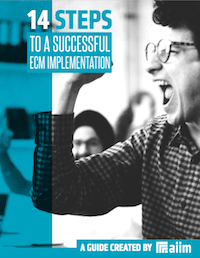The AIIM Blog
Keep your finger on the pulse of Intelligent Information Management with industry news, trends, and best practices.
Digital Transformation | Intelligent Information Management (IIM)
There are two things you should know about me. The first is that I love to eat. I have an appetite that was once described as “alarming.” In my teenage years, I would kick back and devour an entire large pizza in one sitting. As I grew older, I refined my pallet and developed a desire for quality ingredients and a craving for a variety of flavors. The second thing you should know is that I hate to cook.
Share
From the Australian Open offering fans art ball NFTs with real-time match data to JPMorgan Chase’s tiger-friendly lounge in the blockchain-based world Decentraland, metaverse events are exploding into 2022 as powerful new weapons to engage with people.
Share

Making an ECM implementation successful requires planning and attention to detail. The best way to create the right solution is to identify organizational goals and priorities. Learn how to manage a successful implementation in our free guide.
Digital Transformation and Intelligent Information Management Here at AIIM, we talk a lot about Digital Transformation and its link with the practice of Intelligent Information Management. But, what exactly is the link between IIM and Digital Transformation? We explore this topic thoroughly in this previous post, but in summary: Every organization is on – or should be on – a Digital Transformation journey. At the heart of this Transformation journey is the drive toward 1) understanding, anticipating, and redefining internal and external customer experiences. This primary driver depends on other key transformative aspirations such as 2) business agility/innovation, 3) operational excellence, and 4) automated compliance/governance. These drivers require information – in a leverageable form. Today, that’s not always an easy task as the volume, velocity, and variety of information that most organizations need to manage, store, and protect now exceeds their ability to even marginally keep pace with big content challenges. That’s where IIM comes in. This rising tide of information chaos and confusion is creating a demand for new information management practices that extend beyond traditional Enterprise Content Management. AIIM calls this Intelligent Information Management (IIM).
Share
AIIM on Air | Digital Transformation
We hear a lot about "Agile" as a way to manage change and spur innovation. But what exactly is Agile? And how can we use it to make a difference? That was the topic of our AIIM On Air interview with Darrell Rigby. Darrell leads Bain & Company's Global Innovation and Agile practices and is the co-author of "Doing Agile Right." He's a frequent speaker and writer on innovation and Agile, and has appeared on CNBC, CNN, and Bloomberg, and has had his research published in Harvard Business Review, the Wall Street Journal, and the Financial Times.
Share
Digital Transformation | Intelligent Information Management (IIM)
In both our personal and professional lives, the amount of information we deal with on a daily basis is growing exponentially. At the same time, the variety of this information is evolving -- audio files, video files, and more. The cummulative effect? Information Chaos! For many organizations, information is largely viewed as an achilles heel that must be tamed and controlled. Efforts to do so have largely been focused on reducing cost and risk. However, if information is the currency that fuels digital transformation, organizations cannot continue down the path of viewing information management decisions solely through a tactical cost-minimization filter. In a digital age, the everyday decisions that organizations make about information must become strategic business decisions and must also consider information as a strategic enabler.
Share
The shift to remote work has significantly impacted how organizations manage information. We sat down recently with Adam Storch, Vice President of Business Solutions, Micro Strategies, to discuss the effect advancing technology and the move to hybrid workplaces have had on information management.
Share